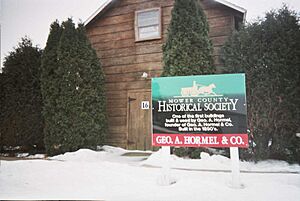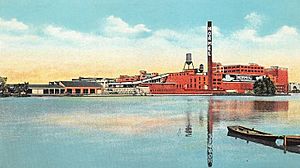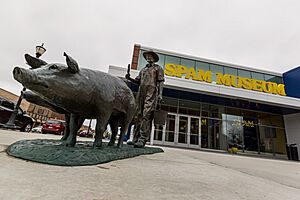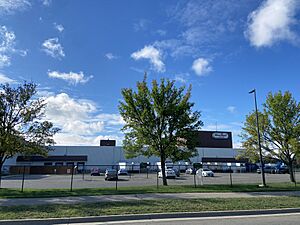Hormel Foods facts for kids
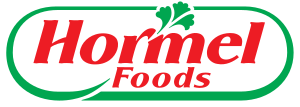
Logo used since 1993
|
|
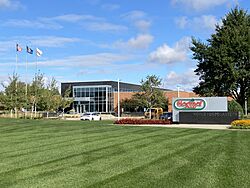
|
|
|
Trade name
|
Hormel Foods |
|---|---|
|
Formerly
|
George A. Hormel & Company (1891–1993) |
| Public | |
| Traded as | |
| Industry | Food processing |
| Founded | 1891 |
| Founder | George A. Hormel |
| Headquarters |
,
U.S.
|
|
Area served
|
Worldwide |
|
Key people
|
James Snee (chairman, president and CEO) |
| Products | Deli meat, ethnic foods, pantry foods, Spam |
| Brands |
|
| Revenue | |
|
Operating income
|
|
| Total assets | |
| Total equity | |
|
Number of employees
|
20,000 (2024) |
| Divisions |
|
| Subsidiaries |
|
| Footnotes / references Financials as of October 27, 2024[update]. |
|
Hormel Foods Corporation, also known as Hormel Foods or simply Hormel, is a big American company that makes and sells food. It was started in 1891 in Austin, Minnesota, by George A. Hormel.
The company first focused on packaging and selling ham, sausage, and other meat products. In 1937, they added Spam, which became very famous. By the 1980s, Hormel started offering many different kinds of packaged and refrigerated foods. The company changed its name to Hormel Foods Corporation in 1993.
Hormel uses its own name on many products. Other well-known brands they own include Planters, Columbus Craft Meats, Dinty Moore, Jennie-O, and Skippy. You can find Hormel products in more than 80 countries around the world.
Contents
Company History
How Hormel Foods Started (1890s-1920s)
The company began as George A. Hormel & Company in Austin, Minnesota, in 1891. George A. Hormel, who was born in 1860, had worked in a meat processing plant in Chicago. He also bought and sold wool and animal hides.
He decided to settle in Austin, Minnesota. With a loan of $500, he opened a meat business. George Hormel focused on making the products. His partner, Albert Friedrich, handled the sales. Their partnership ended in 1891. Hormel then started his own meat packing business. It was in a creamery building near the Cedar River.
In the early days, Hormel also traded hides, eggs, wool, and poultry to earn money. The name "Dairy Brand" was first used in 1903. Over the next ten years, Hormel opened distribution centers in many cities. These included St. Paul, Minneapolis, and Chicago.
In 1915, Hormel began selling dry sausages. These included Cedar Cervelat and Holsteiner. Hormel products started appearing in national magazines like Good Housekeeping in 1916.
Growth and New Products (1920s-1950s)
In 1921, George's son, Jay Hormel, joined the company after serving in World War I. He helped make the company more professional. Hormel focused on creating new products. Their motto was "Originate, don't imitate."
In 1926, the company introduced Hormel Flavor-Sealed Ham. This was America's first canned ham. They also added a canned chicken product line in 1928. During the 1930s, Hormel ads were heard on the radio show The George Burns and Gracie Allen Show.
In 1933, workers formed a union and held a "sit-down strike." This was one of the first successful sit-down strikes in the country.
Hormel Chili and Spam were introduced in 1936 and 1937. In 1938, Jay C. Hormel started a "Joint Savings Plan." This plan allowed employees to share in the company's profits.
By 1942, George and Jay created the Hormel Foundation. This foundation helps fund the Hormel Institute at the University of Minnesota. The institute studies nutrition, animal health, and food technology. During World War II, Hormel's production increased a lot. By 1945, the U.S. government bought 65% of its products. George Hormel, the founder, passed away in March 1946 at 85 years old.
Expanding Product Lines (1950s-2000s)
In 1959, Hormel was the first meatpacker to get the Seal of Approval from the American Humane Society. This was for their humane practices with animals.
New products continued to be introduced. Little Sizzlers sausages came out in 1961. Cure 81 hams were introduced in 1963. Not-So-Sloppy-Joe Sloppy Joe sauce made its debut in 1985.
In 1986, Hormel Foods bought Jennie-O Foods. They also started making Chi-Chi's brand products under a special agreement. The next year, Hormel Foods introduced Top Shelf. These were microwavable meals that didn't need to be frozen. In 1988, they bought Chicken by George. This company was created by former Miss America Phyllis George. That same year, Hormel Foods also introduced microwave bacon. In 1984, Hormel launched the Frank 'n Stuff brand of stuffed hot dogs.
In August 1985, some Hormel workers in Austin, Minnesota, went on strike. This happened because of disagreements about wages and working conditions. Many meatpacking companies faced challenges in the early 1980s. Hormel tried to avoid big wage cuts, but pressure to stay competitive remained. The strike lasted for 10 months, ending in June 1986.
New Millennium and Beyond (2000s-Present)
The Spam Museum opened in Austin, Minnesota, in 2001. In the same year, Hormel Foods bought the Turkey Store. This business was combined with Jennie-O Foods to create Jennie-O Turkey Store.
Hormel Foods started reporting on its social responsibility efforts in 2006. The company has been recognized for being one of the "100 best corporate citizens" for many years.
In 2008, there was a big increase in demand for SPAM. In 2009, Hormel and Herdez del Fuerte created a joint company called MegaMex Foods. This company sells and distributes Mexican food in the United States. Brands include Herdez, La Victoria, and Wholly Guacamole.
Hormel Foods cares about how animals are treated. They work with their suppliers to make sure animals are handled humanely. If any issues are found, Hormel takes action to correct them.
In 2011, Hormel Foods announced a two-for-one stock split. In 2013, Hormel Foods bought Skippy peanut butter from Unilever for $700 million. Skippy is a very popular brand around the world.
In May 2015, Hormel bought Applegate Farms for about $775 million. This expanded their range of meat products.
In 2015, Hormel Health Labs launched Hormel Vital Cuisine. These are meals, shakes, and protein powders for cancer patients. They were developed with chefs and nutrition experts.
Also in 2015, SPAMMY became available for food programs. Four years earlier, Hormel had promised to deliver 1 million cans of this product to families in need in Guatemala.
In 2016, Hormel acquired Justin's, a company that makes nut butters, for $280 million.
Hormel has been recognized as one of the best places to work for LGBT equality by the Human Rights Campaign.
In 2017, Hormel sold Clougherty Packing, which owned the Farmer John and Saag's brands. In October 2017, Hormel announced it would buy Columbus Manufacturing, a deli meat company, for $850 million.
Hormel has been listed as one of the top 100 Best for Vets Employers since 2013.
In April 2019, Hormel Foods and Harvard University Dining Services hosted a food summit. In September 2019, Hormel Foods announced they had reached their goal to reduce non-renewable energy use. Also in September 2019, the company launched a plant-based meat alternative called Happy Little Plants.
On September 18, 2020, Hormel Foods hosted the world's largest virtual pizza party. More than 3,000 people joined the online event. In February 2021, Kraft Heinz sold Planters and its other nuts businesses to Hormel for $3.35 billion.
Impact of the COVID-19 Pandemic
The COVID-19 pandemic affected many businesses, including Hormel. In April 2020, some Hormel Foods plants had to close temporarily. This was because workers tested positive for coronavirus. These closures happened in places like Rochelle, Illinois, Alma, Kansas, and Dallas, Texas. Two Jennie-O turkey plants in Willmar, Minnesota, also closed temporarily. These actions were taken to help keep employees safe.
In October 2020, Hormel even launched a bacon-scented protective mask giveaway.
Company Leaders Over Time
| George A. Hormel | 1891–1926 |
| Jay C. Hormel | 1926–1954 |
| H.H. Corey | 1954–1965 |
| R.F. Gray | 1965–1968 |
| M.B. Thompson | 1968–1972 |
| I.J. Holton | 1972–1981 |
| Richard Knowlton | 1981–1993 |
| Joel Johnson | 1993–2006 |
| Jeff Ettinger | 2006–2016 |
| James Snee | 2016– |
MegaMex Foods
In 2009, Hormel and a Mexican company called Herdez del Fuerte created a joint company. It is called MegaMex Foods. This company makes, markets, and sells Mexican-style sauces and other foods in the United States. Some of their first brands included Chi-Chi's, La Victoria, and Herdez.
MegaMex bought Don Miguel Foods Corporation in 2010. Don Miguel made fresh and frozen prepared foods. These included mini tacos, flautas, and burritos.
In 2011, MegaMex also bought Fresherized Foods. This company is one of the largest providers of refrigerated guacamole in the United States. They make Wholly Guacamole, Wholly Salsa, and Wholly Queso.
In 2021, MegaMex started offering their Tres Cocinas brand of pepper pastes to food service businesses.
See also
 In Spanish: Hormel para niños
In Spanish: Hormel para niños
- List of food companies
- Hormel Historic Home
 | Delilah Pierce |
 | Gordon Parks |
 | Augusta Savage |
 | Charles Ethan Porter |


